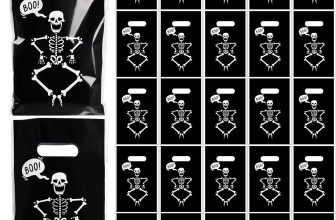
Halloween Movie Review Halloween Ends: The Official Movie Novelization – Didiar
Best Halloween Ends: The Official Movie Novelization Review
Halloween. The name alone conjures images of masked figures, chilling screams, and the seemingly unstoppable embodiment of evil, Michael Myers. The culmination (or a culmination, depending on who you ask) of the rebooted trilogy, Halloween Ends, arrived with considerable fanfare and even more controversy. While the film itself divided audiences, the official movie novelization offered a different perspective, a chance to delve deeper into the motivations, character arcs, and ultimately, the story’s resolution. This article explores the Halloween Ends novelization, dissecting its strengths, weaknesses, and offering a comprehensive review for fans and curious readers alike.
Beyond the Silver Screen: Exploring the Novelization’s Depth
Movie novelizations often get a bad rap. Frequently dismissed as cash grabs or simplified retellings of the film, they are perceived as lacking the artistic merit of original novels. However, the best novelizations transcend this stereotype, offering a richer, more nuanced experience than the source material. The Halloween Ends novelization attempts this, aiming to fill the gaps left by the film, clarify ambiguous plot points, and provide greater insight into the characters’ inner lives. One key difference between the film and the novelization is the internal monologue. The novelization offers a look into the minds of the characters, something a movie can only show through acting, dialogue, and visual cues.
Think of it like comparing a painting to a sculpture. The film, like a painting, relies on visuals and sound to convey its message. The novelization, like a sculpture, allows you to examine the story from multiple angles, exploring its textures and contours in a more intimate way. For fans frustrated by the film’s perceived lack of focus on Michael Myers, or those who felt the character of Corey Cunningham was underdeveloped, the novelization provides a potential remedy. It allows us to spend more time with these figures, to understand their choices, and to grapple with the themes of fear, trauma, and the corrupting influence of evil. This level of depth is not always possible within the constraints of a cinematic runtime. While the film sparked heated debates, the novelization provides a space for quieter contemplation and a more personalized understanding of the narrative. It doesn’t necessarily fix the film’s perceived flaws, but it does offer a supplementary lens through which to view the story.
Character Arcs and Narrative Choices: A Closer Look
The controversial focus on Corey Cunningham in Halloween Ends was a major point of contention for many viewers. The novelization attempts to address this by fleshing out Corey’s backstory, delving into his psychological state after the babysitting tragedy, and exploring his descent into violence. We see more of his interactions with the town of Haddonfield, the judgment and suspicion he faces, and the gradual erosion of his moral compass. This provides a more compelling, albeit still unsettling, explanation for his transformation. He becomes more than just a convenient plot device; he becomes a character grappling with trauma and finding himself drawn to the darkness that lingers in Haddonfield.
Similarly, the novelization explores Laurie Strode’s journey after the events of Halloween Kills. We see her actively trying to heal, to move on, and to embrace a life free from the fear that has haunted her for decades. Her relationship with Allyson is explored in more detail, showcasing the complexities of their bond and the challenges they face as they try to build a future together. This focus on Laurie’s healing process provides a counterpoint to the violence and despair that permeates the story. It reminds us that even in the face of unimaginable trauma, hope and resilience are possible. The novelization doesn’t shy away from the darker aspects of the story, but it also makes room for moments of genuine connection and emotional growth, adding layers of depth to the characters and their relationships. The novelization seeks to provide clarity and understanding where the film may have intentionally left ambiguity.
Pacing, Prose, and Overall Readability
The effectiveness of a movie novelization hinges not only on its ability to expand upon the source material but also on its writing quality. The prose must be engaging, the pacing well-managed, and the overall reading experience enjoyable. Halloween Ends: The Official Movie Novelization generally succeeds in these areas, although it has its moments. The writing style is straightforward and accessible, avoiding overly flowery language or complex sentence structures. This makes it a relatively quick and easy read, even for those who aren’t typically fans of horror novels.
However, at times, the novelization can feel a bit rushed, particularly during the action sequences. While the descriptions of violence are graphic and unsettling, they sometimes lack the visceral impact of the film. The pacing can also be uneven, with certain sections feeling drawn out while others are glossed over too quickly. The effectiveness of a novelization often comes down to the writer’s ability to translate the visual language of cinema into written words. The author must be able to capture the atmosphere, tension, and emotional impact of the film through descriptive prose and vivid imagery. The Halloween Ends novelization mostly succeeds in this regard, but it occasionally falls short, relying too heavily on exposition and dialogue rather than allowing the imagery to speak for itself. Despite these minor flaws, the novelization remains a worthwhile read for fans of the Halloween franchise, offering a deeper understanding of the characters and the story’s themes. It serves as a valuable companion piece to the film, providing a more complete and satisfying experience for those who are willing to engage with it on its own terms.
Differences Between the Film and the Novelization
Here’s a quick comparison table highlighting some key differences:
| Feature | Film | Novelization |
|---|---|---|
| Character Depth | Limited insights into inner thoughts | Extensive exploration of characters’ motivations and psychological states |
| Pacing | Visually driven, fast-paced | More deliberate, with added scenes and extended dialogues |
| Corey Cunningham | Perceived as underdeveloped by some viewers | Greater focus on his backstory, motivations, and relationship with Michael Myers |
| Laurie Strode | Emphasis on her PTSD and preparedness | Deeper exploration of her healing process and relationship with Allyson |
| Ambiguity | Intentionally left some plot points ambiguous | Attempts to provide clarity and resolution to unanswered questions |
| Overall Experience | Visual and auditory impact | More introspective and character-driven |
Practical Applications: Beyond Entertainment
While primarily an entertainment product, the Halloween Ends novelization can offer surprising practical applications, particularly in educational and therapeutic settings.
- Educational Use: The novelization can be used in literature classes to explore themes of trauma, fear, and societal breakdown. Students can analyze the characters’ motivations, discuss the symbolism of the story, and debate the effectiveness of the narrative choices. This can foster critical thinking skills and encourage students to engage with complex social issues.
- Therapeutic Applications: For individuals who have experienced trauma, the novelization can provide a safe space to explore their own feelings and experiences. By witnessing the characters’ struggles and their attempts to heal, readers may find validation and inspiration for their own journeys. However, it’s crucial to approach this material with caution and to seek professional guidance if needed.
- Writing and Storytelling: Aspiring writers can learn valuable lessons from the Halloween Ends novelization, both in terms of what works and what doesn’t. By analyzing the author’s techniques, they can gain insights into character development, plot construction, and the use of descriptive language.
Pros and Cons: Weighing the Value
Like any product, the Halloween Ends novelization has its strengths and weaknesses. Understanding these can help you determine if it’s the right choice for you.
Pros:
- Enhanced Character Development: Deeper exploration of the characters’ motivations and backstories.
- Clarified Plot Points: Provides answers to some of the questions left unanswered by the film.
- Expanded World-Building: Offers a more detailed look at the town of Haddonfield and its inhabitants.
- Improved Pacing: Allows for a more deliberate and thoughtful reading experience.
- Accessibility: The writing style is straightforward and easy to understand.
Cons:
- Uneven Pacing: Some sections feel rushed while others drag on.
- Lack of Visceral Impact: The descriptions of violence sometimes lack the power of the film.
- Potential for Controversy: The focus on Corey Cunningham may still be off-putting for some fans.
- Reliance on Exposition: At times, the novelization relies too heavily on telling rather than showing.
- Not a Replacement for the Film: It’s best viewed as a companion piece rather than a substitute.
Alternatives: Exploring Other Horror Novelizations
If you’re not convinced that the Halloween Ends novelization is for you, there are plenty of other excellent horror novelizations to explore. Here’s a brief comparison:
| Novelization | Source Material | Key Features | Potential Appeal |
|---|---|---|---|
| The Exorcist by William Peter Blatty | Film of the same name | Expands on the psychological and religious themes, delving into the characters’ faith and doubt | Readers interested in theological horror and character-driven narratives |
| Psycho by Robert Bloch | Film of the same name | Offers a deeper understanding of Norman Bates’s disturbed mind, providing a chilling psychological portrait | Fans of classic horror and psychological thrillers |
| Dracula by Bram Stoker | N/A (Original Novel) | While not a novelization, the original novel is a must-read for any horror fan | Those interested in the origins of vampire lore and gothic horror |
| IT by Stephen King | Film Adaptation | A sprawling epic that explores the power of childhood trauma and the nature of evil | Readers who enjoy long, character-driven horror novels with complex themes |
While these alternatives offer different flavors of horror, they all demonstrate the potential of the novelization to enhance and expand upon the source material. Whether you’re drawn to psychological thrillers, theological horror, or epic tales of good versus evil, there’s a horror novelization out there to satisfy your cravings. Ultimately, the best choice depends on your individual preferences and interests. And if you’re looking to add something fun, Smart Robot Gift Guide offers options outside of horror!
FAQ: Addressing Common Questions
Here are some frequently asked questions about the Halloween Ends novelization:
Q: Is the novelization better than the movie?
A: That’s a subjective question! The novelization offers a different experience than the film. It delves deeper into the characters’ motivations and expands on the plot, which may appeal to some viewers who felt the film was lacking in these areas. However, the film relies on visual and auditory cues to create a sense of horror and suspense, which the novelization may not be able to replicate fully. Ultimately, whether you prefer the novelization or the film depends on your individual preferences and what you’re looking for in a Halloween story. Some found the movie’s shift in focus frustrating, while the novelization gives Corey Cunningham a more complete story. It really depends on what aspects you prioritize!
Q: Does the novelization explain Michael Myers’s role in the story better?
A: Yes, to a degree. While Michael Myers’s presence in Halloween Ends was a point of contention for many viewers, the novelization attempts to provide more context for his diminished role. It explores the idea that evil can take different forms and that Michael Myers may have become a symbol or a catalyst for violence rather than the sole source of it. The novelization also delves into the idea that fear and trauma can be contagious, infecting individuals and communities and leading them to commit acts of violence. It doesn’t necessarily "explain" Michael Myers’s actions in a definitive way, but it offers a more nuanced interpretation of his role in the story.
Q: Is the novelization scary?
A: Yes, but in a different way than the film. The novelization relies more on psychological horror and suspense than on jump scares or graphic violence. While there are certainly moments of intense violence and gore, the focus is more on the characters’ internal states and the psychological impact of their experiences. The novelization explores themes of fear, trauma, and the corrupting influence of evil, creating a sense of unease and dread that can be quite unsettling. If you’re looking for a purely visceral horror experience, the film may be more your style. But if you appreciate psychological horror and character-driven narratives, the novelization may be more satisfying.
Q: Does the novelization change the ending of the movie?
A: No, the novelization does not change the ending of the movie. It follows the same basic plot points and culminates in the same final confrontation between Laurie Strode and Michael Myers. However, the novelization may provide more context and clarity for the ending, explaining the characters’ motivations and the symbolism of the events. It also allows for a more detailed exploration of the emotional aftermath of the confrontation, showing how the characters are affected by what has happened. So, while the ending itself remains the same, the novelization offers a richer and more nuanced understanding of its significance.
Q: Is the novelization worth reading if I didn’t like the movie?
A: It depends on why you didn’t like the movie. If you disliked the film due to its pacing, character development, or ambiguous plot points, the novelization may offer a more satisfying experience. It provides a deeper exploration of the characters, clarifies some of the ambiguous elements, and allows for a more deliberate reading experience. However, if you disliked the film due to its core themes, its portrayal of violence, or its overall tone, the novelization is unlikely to change your mind. It essentially tells the same story, just in a different format. So, consider what aspects of the film you disliked and whether the novelization is likely to address those issues before making a decision.
Q: Where can I purchase the Halloween Ends novelization?
A: The Halloween Ends novelization is widely available at most major booksellers, both online and in brick-and-mortar stores. You can find it on Seller, Barnes & Noble, and other online retailers. It’s also likely to be available at your local bookstore. The novelization is available in both print and ebook formats, so you can choose the format that best suits your preferences.
Q: Who wrote the Halloween Ends novelization?
A: The Halloween Ends novelization was written by Tim Waggoner. Waggoner is a prolific horror author who has written numerous novels, short stories, and tie-in works for various franchises. He has a proven track record of delivering engaging and suspenseful narratives, making him a suitable choice for adapting Halloween Ends into novel form.

Price: $8.99 - $7.74
(as of Sep 11, 2025 02:31:35 UTC – Details)






